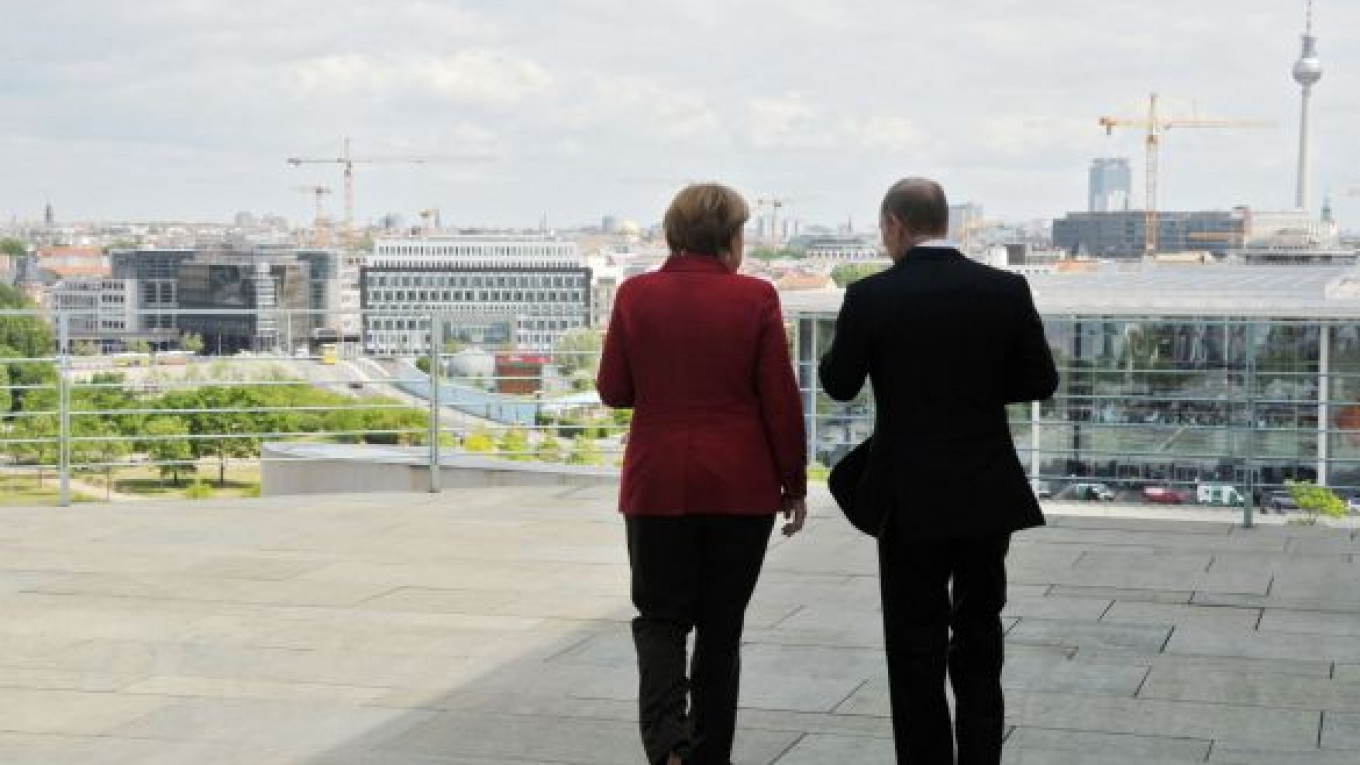Under mounting international pressure, President Vladimir Putin denied that Moscow is fueling bloodshed in Syria with arms exports and that Russia unilaterally supports the government in Damascus.
Speaking after separate talks with German Chancellor Angela Merkel and French President Francois Hollande, Putin also urged countries to continue to back international envoy Kofi Annan’s peace initiative as the best way to avoid full civil war.
"Mr. Annan is a very experienced and respectable person, and we must do everything for his mission to succeed. I think it is counterproductive to announce his mission as a failure in advance," Putin told a news conference in Paris on Friday.
"Sanctions don't always work. The main thing we need to do is to prevent the situation from developing under the worst scenario and not let a civil war take place," he said.
The April 12 plan calls for the government to pull heavy weapons back from towns and cities, after which both sides are to end violence and begin a dialogue, but it has stalled at the first hurdle.
Hollande said Syrian President Bashar Assad's government had disqualified itself from ruling Syria.
"No solution to this crisis is possible without the departure of Bashar Assad," he said, standing next to Putin. "I believe that more sanctions are an essential part of a political solution."
The fighting has claimed more than 10,000 lives so far, prompting the United States and the European Union to speak in favor of a UN Security Council-imposed arms embargo. Moscow, together with fellow veto wielder China, has stubbornly prevented UN Security Council sanctions against Syria.
Syria is one of Russia's top weapons customers, and multiple reports have suggested that arms shipments have continued during the 14-month bloody clashes between the government and opposition forces.
In the latest delivery, the Professor Katsman cargo ship, which Western officials say was heavily laden with Russian weapons, docked at the Syrian port of Tartus on May 26, the group Human Rights First said Thursday.
Putin, speaking at a joint news conference with Merkel earlier Friday, offered a flat denial in response to a question on whether Moscow was ready to impose an arms embargo on Syria.
"Russia is not delivering arms that could be used in a civil conflict," Putin said.
He also insisted that Russia was not taking sides between Assad and the opposition.
"Those who say that Russia unilaterally supports the Assad regime, they are wrong," he said, according to a posted on the Kremlin website.
"We have had good relations with Syria for many years, but we do not support any of the sides that might start a civil war," he said.
But his comments were immediately met with skepticism by U.S. Secretary of State Hillary Clinton, who said she was not convinced that Moscow was neutral.
Russia is viewed in the United Nations, in Damascus and around the world "as supporting the continuity of the Assad regime," Clinton told reporters in Oslo.
"The continued supply of arms from Russia has strengthened the Assad regime," and the fact "that Russia has maintained this trade … has raised serious concerns.”
Clinton discussed the situation with Foreign Minister Sergei Lavrov in a telephone call Saturday, a senior State Department official said.
"They both agreed that we have to work together," said the official, who provided details of the private discussion on condition of anonymity. "Her message to him was that we have to start working together to help Syrians with a serious political transition strategy."
Moscow softened its stance earlier in the week in the wake of international outrage at a massacre in the Syrian town of Houla, which killed more than 100 civilians, including dozens of children.
However, the Foreign Ministry on Friday evening warned against attempts to use the massacre for political purposes aimed at justifying a military intervention, as happened in Libya last year.
"The tragedy in Houla showed what financial aid and weapons smuggling to rebels, the hiring of foreign mercenaries and flirtations with various extremists can lead to," the ministry said in a on its website.
(MT, Reuters, AP)
During talks in Berlin, Merkel pressed Putin to allow "democratic diversity" to develop in Russia.
"I made clear on my part that we have every interest in democratic diversity in Russia being able to develop further, because my experience is it is only that way that a truly robust civil society can arise which supports the development of the country," Merkel told reporters after meeting Putin.
Putin, who was standing alongside her, did not respond.
A Message from The Moscow Times:
Dear readers,
We are facing unprecedented challenges. Russia's Prosecutor General's Office has designated The Moscow Times as an "undesirable" organization, criminalizing our work and putting our staff at risk of prosecution. This follows our earlier unjust labeling as a "foreign agent."
These actions are direct attempts to silence independent journalism in Russia. The authorities claim our work "discredits the decisions of the Russian leadership." We see things differently: we strive to provide accurate, unbiased reporting on Russia.
We, the journalists of The Moscow Times, refuse to be silenced. But to continue our work, we need your help.
Your support, no matter how small, makes a world of difference. If you can, please support us monthly starting from just $2. It's quick to set up, and every contribution makes a significant impact.
By supporting The Moscow Times, you're defending open, independent journalism in the face of repression. Thank you for standing with us.
Remind me later.






